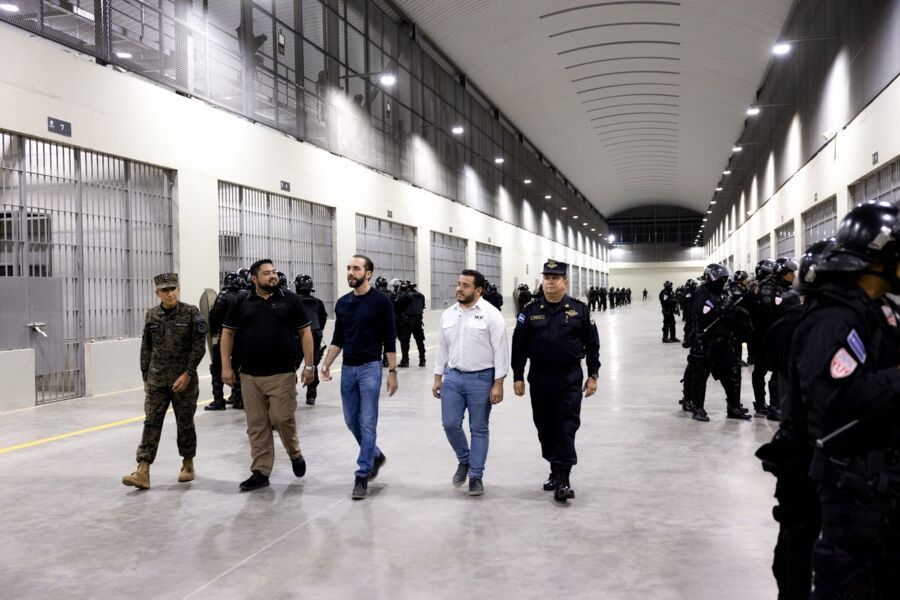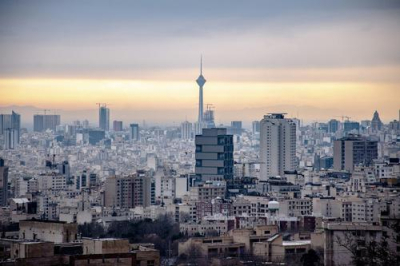Bukele’s crackdown on freedoms hides behind the thick veil of government propaganda
El Salvador has been in the news a lot recently, either because the country fiercely wants to become the next Guantanamo under US President Donald Trump’s administration, or because drastic surveillance and security upgrades have turned the small Central American country into a hot tourist destination. If this is how you read about El Salvador in the news, you were definitely a target of government propaganda.
The Salvadoran government thrives on attention, and in order to get it, it has built a sophisticated propaganda machine that uses influencers to speak wonders of its success while hiding the systematic human rights violations taking place.
As a Salvadoran living in Europe, I usually get a very understandable puzzled look when I tell people where I’m from. But what is really happening down there might feel closer than you think. This is a story about power, state-controlled image, repression, and the consequences of staying silent when governments erode freedoms behind shiny PR campaigns.
In 2019, Nayib Bukele, a young politician with a meteoric political career, became President of El Salvador. He came to power with promises to improve Salvadoran lives: fighting corruption, tackling gang violence, and modernizing the state were his top priorities. He promised to make history and, in exchange, asked his followers to agree to take a “sour pill”, that is to accept the ensuing draconian measures the government would take.
Our 30-year-old democracy, won after a 12-year-long armed conflict, became an obstacle for Bukele, who bullied his way to power. In 2016, when his name was linked to cyberattacks on two major newspapers, he organized a protest outside the Attorney General’s office to demand that the investigation against him ceased. In 2017, then-mayor of the capital San Salvador, Bukele denied access to archaeologists doing research on the restoration of the historical center and cordoned off the site with armed local police. In 2018, a group of demonstrators stormed the Supreme Electoral Tribunal in response to Bukele’s call for alleged fraud in the upcoming election.
This autocratic style marked his way of governance both as mayor and as President.
In February 2020, when lawmakers refused to fast-track a loan for his security plan, he stormed Congress with heavily armed military and police, an attempted coup that he claimed was stopped by God’s divine intervention. Trade unions and local NGOs, as well as foreign governments and international organizations, publicly noted that Bukele was pushing the country to the edge of a precipice, and yet nothing changed. The Attorney General announced an investigation, but there were no consequences.
The following year, in May 2021, once his party took control of Congress, Bukele removed the Attorney General and the Constitutional Chamber judges and illegally appointed trusted people in their place, giving him full control and eliminating the system of checks and balances.

All of this happened during the COVID-19 pandemic, which was used as an excuse to use public funds arbitrarily. Investigative media and anti-corruption NGOs recorded a long list of cases of embezzlement. Because the accused were loyal to him, Bukele decided to dissolve the Anti-Corruption Commission, one of his biggest campaign promises. With it, the last remnant of the anti-corruption fight was crushed.
“El Salvador has experienced a significant decrease in its homicide rates as a result of Bukele’s war against gangs” – this is probably the main message you heard in the news. The number of killed per 10,000 people fell from 51 in 2019 to just 1.9 in 2024. Once named the “murder epicenter of the world,” Bukele rebranded El Salvador as “the safest country in the Western hemisphere.” And while it is always good news that fewer people are being killed and more feel at peace after several gangs have disbanded, the stats rely only on official numbers, data that is impossible to consult or contrast.
Bukele’s rule echoes that of Europe’s illiberal leaders, like Viktor Orbán in Hungary and Recep Tayyip Erdoğan in Turkey, who have used democratic mechanisms to centralize power and suppress dissent. They all follow the same script: weakening institutions, controlling the media, and using a permanent state of emergency to justify repression. But Bukele goes further.
A highly advertised State of Exception has been in place since March 2022, when 87 people were killed during a weekend of heightened gang violence. The temporary measure has been prolonged a number of times, “until we capture the last remaining [gang member,]” the authorities said.
The State of Exception effectively permanently suspended the right to freedom of association and assembly, the right to privacy of communications, and the right to due process. This “new normal” has given way to police and military abuse of power, mass arbitrary detention, enforced disappearances, and torture. Over 86,000 people (including more than 3,000 minors) have been detained without due process, at least 367 died in custody, and 327 cases of forced disappearance have been reported to date.
Bukele shamelessly offered to imprison Venezuelans and other Latino immigrants Trump has targeted as terrorists, because it feeds his security-over-democracy narrative and helps to portray him as a successful leader with an iron fist.
Fearing retaliation, local residents have embraced self-censorship. A January 2025 survey indicates that 90% of Salvadorans feel safe in their communities, and 87.5% attribute this to the State of Exception. However, the same survey reveals that 70% of respondents are afraid to speak openly about said measure, fearing reprisals or detention.
“No matter what you have heard, El Salvador is not safe.”
Over the years, Bukele has split society between “good Salvadorans” and “bad Salvadorans”. The line that divides them, however, is blurred and has a lot to do with how loyal citizens are.
Just in the first two weeks of May, seven journalists fled the country after being warned of arrest warrants being issued against them for publishing new evidence of the negotiations between Bukele and the gang leaders to reduce the homicide rate. A group of people asking for the president’s intervention to prevent eviction was repressed outside of Bukele’s residence. A top anti-corruption lawyer and human rights advocate was detained on charges of embezzlement.
True to his style, Bukele blamed NGOs and media outlets for “brainwashing citizens”. To fight them, the Congress he controls approved a Foreign Agents Law that forces every person, news organization, and NGO that receives funds from abroad to pay 30% in taxes for each donation and gives the government complete power to deny such funds and cancel their registration.
No matter what you have heard, El Salvador is not safe. The climate of terror is such that organizations have decided to self-censor to avoid repercussions. A number of social media accounts are posting mental health and legal advice for those who could end up arbitrarily detained. Bukele might say he is “the coolest”, but that does not make him any less of a dictator.
María Luz Nóchez is an independent investigative journalist based in Europe. Between 2011-2023 she was a staff member at the Salvadoran investigative newsroom El Faro.
Власть — это независимое медиа в Казахстане.
Поддержите журналистику, которой доверяют.
Мы верим, что справедливое общество невозможно построить без независимой журналистики и достоверной информации. Наша редакция работает над тем чтобы правда была доступна для наших читателей на фоне большой волны фейков, манипуляций и пропаганды. Поддержите Власть.
Поддержать Власть








